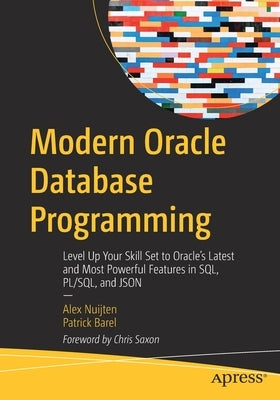Description
Part I looks at features in SQL and PL/SQL that are underused and not well known. You'll learn about new join types, pattern matching across rows, Top N pagination (useful in reporting!), qualified expressions, and enhancements to iterators that reduce code complexity and make your logic easier to understand.
Part II covers how and when to invoke PL/SQL from SQL while maintaining performance. You'll learn about SQL macro functions for creating reusable SQL fragments, polymorphic table functions with return types determined by incoming argument types, and constructing and parsing JSON documents for data interchange with other systems.
Part III introduces a vast array of built-in functionality that Oracle provides that is just waiting to be used. Edition-based redefinition enables zero-downtime application and schema upgrades. Data redaction enables easier compliance with privacy laws and similar regulations by protecting sensitive data from those who have no need to see it. Virtual private databases provide the appearance of giving each user their own database, again helping to secure sensitive data. These features are just a taste of what the book provides. Soon you'll be improving your skills and wondering why you ever worked so hard to solve problems that Oracle Database already solves for you. What You Will Learn
- Write more powerful code by incorporating underused features in SQL and PL/SQL
- Optimize your integration between SQL and PL/SQL for best performance
- Take advantage of enhanced set operators, lateral joins, row-based pattern matching, and other advanced features in SQL
- Make your code easier to understand through your use of newer PL/SQL features, such as qualified expressions and iterator enhancements
- Integrate with web services and external data sources directly from the database
- Create and parse JSON documents for easy data exchange and flexible schema design
Any developer who is writing SQL or PL/SQL, PL/SQL experts who want to level up their knowledge and skills to the latest features that Oracle Database provides, and developers who don't want to write their own solutions only to find out later that they've wasted their time by building something that Oracle Database provides out of the box
Author: Alex Nuijten, Patrick Barel
Publisher: Apress
Published: 02/18/2023
Pages: 576
Binding Type: Paperback
Weight: 2.28lbs
Size: 10.00h x 7.00w x 1.22d
ISBN13: 9781484291658
ISBN10: 1484291654
BISAC Categories:
- Computers | Database Administration & Management
About the Author
Alex Nuijten is an independent consultant specializing in Oracle database development with PL/SQL and Oracle Application Express (APEX). Besides his consultancy work, he conducts training classes in APEX, SQL, and PL/SQL. He is a speaker at numerous international conferences, such as ODTUG, Oracle Open World, HrOUG, UKOUG, IOUG, OUGF, BGOUG, NLOUG APEX World, OBUG, and many more. He has received several Best Speaker awards and writes at regular intervals about Oracle Application Express and Oracle database development on his blog "Notes on Oracle." He is co-author of Oracle APEX Best Practices and Real World SQL and PL/SQL. Because of his contributions to the Oracle community, Alex was awarded the Oracle ACE Director membership in August 2010.
Patrick Barel is a PL/SQL developer for Qualogy in The Netherlands. Besides working with SQL and PL/SQL Developer, he has written different plug-ins for PL/SQL. He publishes articles on his own blog and on the Qualogy blog. He is a speaker at international conferences, such as ODTUG, UKOUG, AUSOUG, NZOUG, IOUG, OUGN, NLOUG, DOUG, HrOUG, and many more. Patrick was awarded the Oracle ACE membership. In 2015, he received the Oracle Developer Choice Award in the PL/SQL Category. In 2019, he was promoted to Oracle ACE Director.

